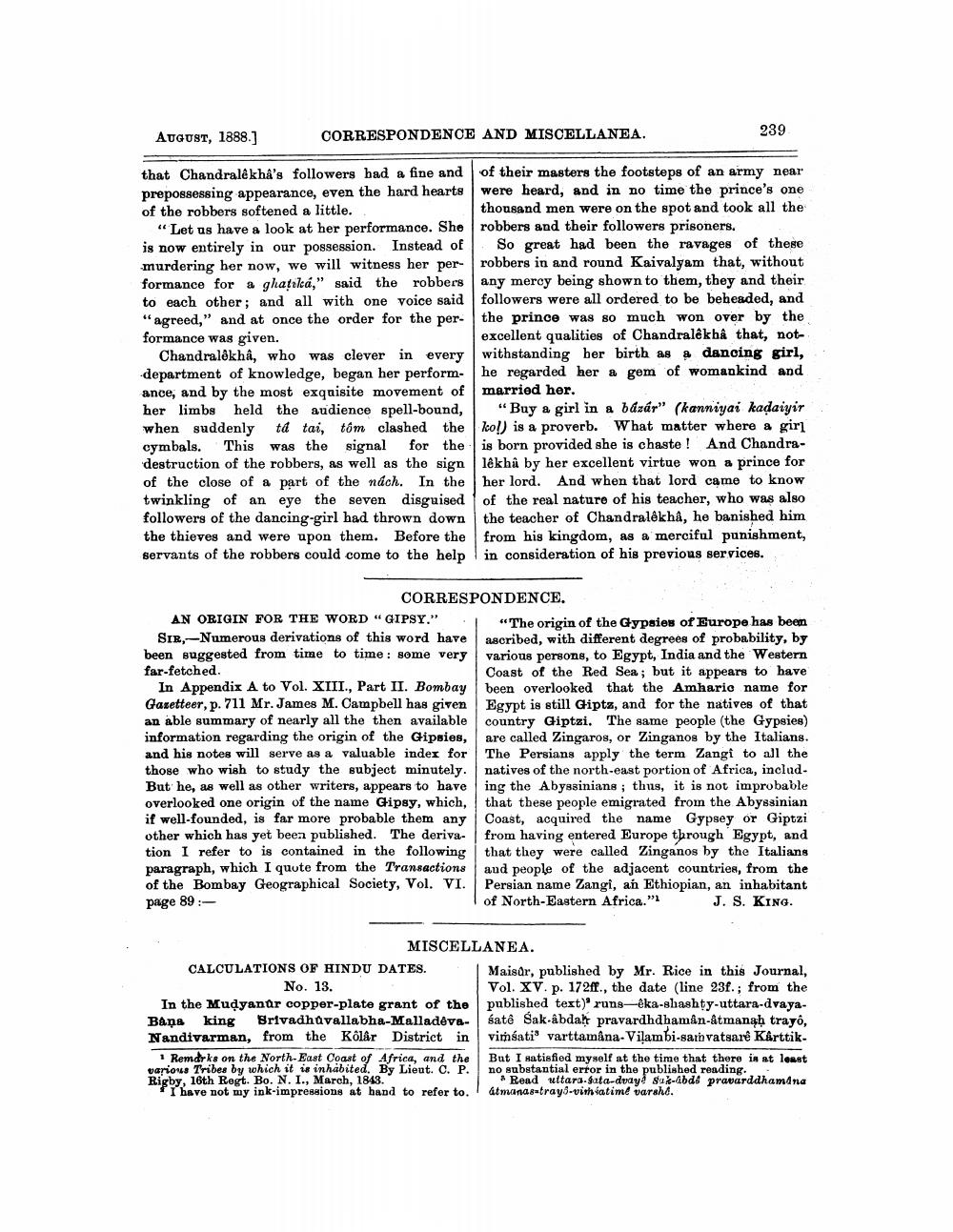________________
AUGUST, 1888.]
CORRESPONDENCE AND MISCELLANEA.
that Chandralê khâ's followers had a fine and prepossessing appearance, even the hard hearts of the robbers softened a little.
"Let us have a look at her performance. She is now entirely in our possession. Instead of murdering her now, we will witness her performance for a ghatiká," said the robbers to each other; and all with one voice said "agreed," and at once the order for the performance was given.
Chandralekha, who was clever in every department of knowledge, began her performance, and by the most exquisite movement of her limbs held the audience spell-bound, when suddenly td tai, tôm clashed the cymbals. This was the signal for the destruction of the robbers, as well as the sign of the close of a part of the nách. In the twinkling of an eye the seven disguised followers of the dancing-girl had thrown down the thieves and were upon them. Before the servants of the robbers could come to the help
CORRESPONDENCE.
AN ORIGIN FOR THE WORD "GIPSY."
SIR, Numerous derivations of this word have been suggested from time to time: some very far-fetched.
In Appendix A to Vol. XIII., Part II. Bombay Gazetteer, p. 711 Mr. James M. Campbell has given an able summary of nearly all the then available information regarding the origin of the Gipsies, and his notes will serve as a valuable index for those who wish to study the subject minutely. But he, as well as other writers, appears to have overlooked one origin of the name Gipsy, which, if well-founded, is far more probable them any other which has yet been published. The derivation I refer to is contained in the following paragraph, which I quote from the Transactions of the Bombay Geographical Society, Vol. VI. page 89:
CALCULATIONS OF HINDU DATES. No. 13.
In the Muḍyanûr copper-plate grant of the Bana king Brivadhuvallabha-MalladêvaNandivarman, from the Kôlår District in
of their masters the footsteps of an army near were heard, and in no time the prince's one thousand men were on the spot and took all the robbers and their followers prisoners.
So great had been the ravages of these robbers in and round Kaivalyam that, without any mercy being shown to them, they and their followers were all ordered to be beheaded, and the prince was so much won over by the excellent qualities of Chandralekha that, notwithstanding her birth as a dancing girl, he regarded her a gem of womankind and married her.
"Buy a girl in a bázár" (kanniyai kadaiyir ko!) is a proverb. What matter where a girl is born provided she is chaste! And Chandralêkhû by her excellent virtue won a prince for her lord. And when that lord came to know of the real nature of his teacher, who was also the teacher of Chandralekhâ, he banished him from his kingdom, as a merciful punishment, in consideration of his previous services.
MISCELLANEA.
Remarks on the North-East Coast of Africa, and the various Tribes by which it is inhabited. By Lieut. C. P. Rigby, 16th Regt. Bo. N. I., March, 1843.
I have not my ink-impressions at hand to refer to.
239
"The origin of the Gypsies of Europe has been ascribed, with different degrees of probability, by various persons, to Egypt, India and the Western Coast of the Red Sea; but it appears to have been overlooked that the Amharic name for Egypt is still Giptz, and for the natives of that country Giptzi. The same people (the Gypsies) are called Zingaros, or Zinganos by the Italians. The Persians apply the term Zangi to all the natives of the north-east portion of Africa, including the Abyssinians; thus, it is not improbable that these people emigrated from the Abyssinian Coast, acquired the name Gypsey or Giptzi from having entered Europe through Egypt, and that they were called Zinganos by the Italians and people of the adjacent countries, from the Persian name Zangi, an Ethiopian, an inhabitant of North-Eastern Africa." J. S. KING.
Maisûr, published by Mr. Rice in this Journal, Vol. XV. p. 172ff., the date (line 23f.; from the published text) runs-êka-shashty-uttara-dvayasatê Sak-abda pravardhdhamân-âtmanaḥ trayô, vimsati varttamâna-Vilambi-samvatsarê KêrttikBut I satisfied myself at the time that there is at least no substantial error in the published reading.
Read uttara-gata-dvayê sak-abdé pravarddhamana átmanas-trays-vimhiatime varshe.




